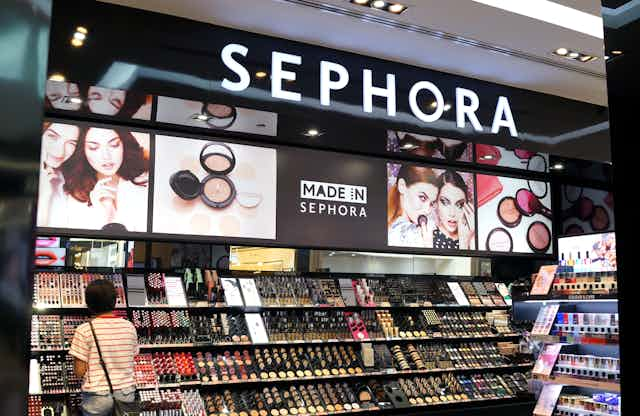Sephora, the French multinational retailer of personal care and beauty products, has made a comeback to the UK after an 18-year hiatus. The company’s return to the UK market with stores in London and plans for further outlets outside the capital, raises questions about what has changed in the beauty industry and within Sephora itself to prompt the move.
Back in 2005, Sephora decided to close its UK stores due to market challenges and fierce competition from homegrown retailers like Boots and Superdrug. However, the beauty landscape has changed significantly since then, with the rise of e-commerce, social media influencers and a growing demand for premium and niche beauty products.
Beauty has witnessed a boom in recent years, with consumers increasingly willing to spend more on high-end and specialist products. Sephora’s unique positioning as a one-stop-shop for a wide range of brands, from established names like Dior, Lancôme and Estée Lauder to trendy indie labels such as Drunk Elephant, The Ordinary and Fenty Beauty, could give it a competitive edge in the UK market.
These brands, along with Sephora’s own label, offer a diverse range of premium skincare, makeup and fragrance products. In contrast, Boots and Superdrug primarily focus on more affordable brands, with a limited selection of high-end products.
One of the key factors that may have influenced Sephora’s decision to re-enter the UK market is the surge in online shopping. Sephora launched its online store in the UK in 2022 after acquiring Feelunique, a British online retailer. It has been investing heavily in its digital presence, offering a seamless online shopping experience, virtual try-on features and personalised recommendations.
The power of AI
Another factor that may have influenced Sephora’s decision is the growing power of artificial intelligence (AI) in the beauty industry. AI-powered tools and technologies are revolutionising the way consumers discover, try and purchase beauty products.
Sephora has been at the forefront of this trend, leveraging AI to offer personalised skincare routines, virtual makeup try-on, and product recommendations based on individual preferences and skin types. By harnessing the power of AI, Sephora may be able to provide a more engaging and tailored shopping experience to its UK customers.
The use of AI in beauty and fashion retail is a growing trend, with many companies recognising its potential to transform the shopping experience. Estée Lauder has partnered with Perfect Corp for AI-powered virtual try-on tools. L'Oréal uses AI to create personalised skincare routines through its Skin Genius platform. Fashion retailer Stitch Fix employs AI algorithms for personalised styling recommendations.
However, Sephora’s extensive implementation of AI across its online and in-store offerings sets it apart. If successful, this ability to offer highly personalised, engaging and convenient shopping experiences could be a key differentiator as the firm re-enters the UK market.
Sephora’s return comes at a time when gen Z is emerging as a significant force in the beauty market. Gen Z consumers are seen as loving experimentation, embracing diversity and seeking authentic and sustainable brands.
Sephora’s wide range of products, its inclusive marketing, and its focus on “clean beauty” – with ranges that avoid some potentially harmful ingredients like parabens and mineral oils – could resonate well with this demographic. It has also pledged to dedicate 15% of its shelf space to products from black-owned brands.
By targeting gen Z consumers through social media campaigns, influencer partnerships and in-store experiences, Sephora could tap into a market segment of approximately 12.9 million consumers in this demographic across the UK.
Sephora’s return to the UK also positions the company to capture the attention of gen Alpha, the cohort born from around 2010 onwards. It has already managed to capture an influential market on social media, where gen Alpha fans of the store have been referred to as “Sephora Kids”, known for posting “hauls” of their very expensive and large skincare routines.
While still young, gen Alpha is growing up in a world where technology, social media and e-commerce are ubiquitous. By establishing a strong presence in the UK market now, Sephora can build brand loyalty among gen Alpha consumers and adapt its strategies to meet their evolving preferences.
Back for good?
Sephora’s return also comes at a time when the company is expanding its global footprint. The retailer has been opening new stores in various regions, including China, Russia and the Middle East. This international growth strategy could have given Sephora the confidence and resources to tackle the UK market once again.
However, the brand’s success in the UK is not guaranteed. The company will still face stiff competition from established players like Boots and Superdrug, as well as newer entrants like Glossier and Cult Beauty. It will be crucial for Sephora to differentiate itself through its product offerings, in-store experience and customer service.
But its return to the UK market after nearly 20 years is a bold move that reflects the changing dynamics of the beauty industry. The rise of e-commerce, the power of AI, the demand for premium beauty products and the growing influence of gen Z and gen Alpha have likely contributed to the decision.
While challenges remain, Sephora’s unique positioning, technological capabilities, and financial backing from its owner, the luxury goods giant LVMH, could help it navigate the competitive UK beauty market.

